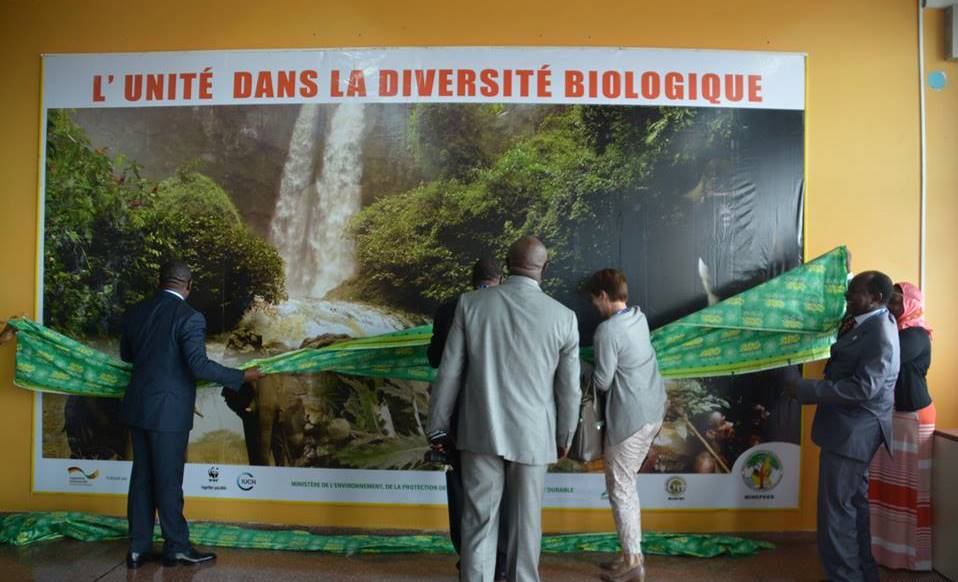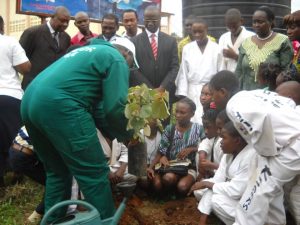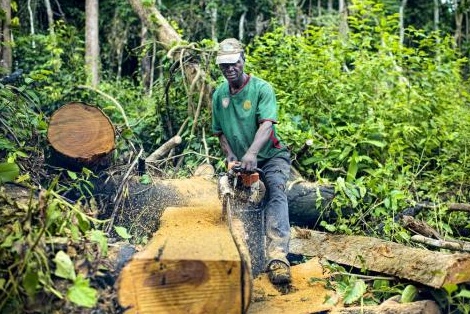
By Elias Ntungwe Ngalame
In the face of multiple urban climate challenges with rising temperatures, persistent floods, drought and other climate threats hitting Cameroon’s major cities, the government is multiplying efforts for a green city drive as the country prepares to host the 2019 African Nations Cup.
Authorities say they have pledged to steer deforested cities from edge of climate disasters with a multi-facet urban city greening project.
« It is our responsibility to give our cities the much needed environmental facelift and make them safe now and in the future,» says the minister of forestry and wildlife, Jules Doret Ndongo, at the launching of the 2018 tree planting season in Bertoua in the East region.
The Minister of Environment, Nature Protection and Sustainable Development in collaboration with WWF and partners, on May 28 2018, mounted the first ever giant biodiversity poster in the 2 international airports in Cameroon to walk the green city talk.
The event accordingly marked the end of 2018 biodiversity day celebrations and beginning of World Environment Day celebrations in Cameroon.
Environment experts say Cameroon has multiplied investment efforts in recent years in line with the government’s drive towards economic emergence by 2035, triggering rapid disappearance of its forested areas with expanding urbanization and population surge in most cities.
« Cameroon is on the move with multiple investments as the country pushes towards economic emergence. Unfortunate this also means sacrificing huge forested areas where these projects are located, » says Zachee Nzoh Ngandembou, CEO of the Centre for Environment and Rural Transformation (CERUT), an NGO that promotes rural development in Cameroon.
A report by Global Forest Watch shows forest loss in Cameroon of 777,000 hectares between 2001 and 2015.
Experts say the deforestation has since 2016 aggravated with heavy investment projects in cities following

Cameroon’s preparation to host the 2019 African Cup of Nations Games.
Many of these infrastructures in roads, stadia and other sports training grounds, hotels, urban housing scheme etc have seen large portions of hitherto forest lands sacrificed exposing many cities to scorching heat and high temperatures and other climate extremes.
« Forest losses not only hurt ecosystems and drive climate change but put the livelihood of millions of city dwellers in danger, » says Paul Donfack, a consultant with the African Forest Forum.
The environmental impact of forest loss is really immeasurable with extreme weather like rising city temperatures, heavy floods, droughts and water shortages thus putting the lives of vulnerable population at risk, he says.
But the government is hoping the new urban greening forests project will help cities catch up with the loses.
« The new urban reforestation project will help boost the tree planting schemes launched by the government in 2017 , » says Bruno Mfou’ou Mfou’ou, director of forestry in the ministry of forestry and wildlife.
The government in 2017 launched a project to restore 12 million hectares (30 million acres) of deforested land to redress the challenges of dwindling forests and help mitigate the effects of climate change, he said.
« The urban city greening scheme is an addition to boost what the government started in 2017 , » Bruno said.
The sum of over 600million FCFA annual support to the selected city councils has been earmarked, he disclosed.
The project will assist councils deal with deforestation, climate extreme problems from flooding, drought and increasing temperatures, to water shortages as most city population and urbanization continue to swell.
« The city greening project will involve tree planting principally targeting flood-prone areas, multiple recreational spots as well as the drought stricken Cameroon’s northern regions, » Minister Jules Doret Ndongo said.
The government accordingly has not been left alone in the city greening excercise experts say.
Earlier on March 21, during activities to celebrate International Forest Day forest stakeholders in Yaounde led by Green Peace and international NGO, launched a pilot green space project at the Baptist High School, Awai.
The forest experts called on the government to put in place national policies that will support sensitisation efforts about the importance of trees in urban cities.
« We call on the Cameroon government to institute a national policy that will ensure sustainable tree in cities, » said Greenpeace Africa’s Environmental Ambassador, Biakolo Onana Alain.
Greenpeace Africa Forest Campaigner, Sylvie Djacbou emphasised on the need to protect the Congo Basin Forest. “By its sheer size, the Congo Basin Forest serves as a large carbon reservoir of global significance for regulating greenhouse gas and carbon dioxide. Greenpeace stands with local and indigenous communities to protect the forest against illegal industrial agriculture and land grabbing,” concluded Djacbou.
According to the government project plan,the multi-faceted scheme that will also boost the forest in the Congo Basin region,involve not only the planting of some 600.000 trees anually for the next five years but also supporting some water supply projects like rain water harvesting, boreholds as well as draining schemes and sewage disposal began by some city councils like Douala and Yaounde.
Council authorities say multiplying tree-replete recreational spots in cities will help inhabitants find safe havens against rising city temperatures and set refforestation examples that could be replicated in other coutries in the Congo Basin region.
Environment experts have saluted the scheme to engage city councils on a genuine green economy path that offers solutions for both climate and agriculture challenges.
« It is economically advantageous if projects like these are owned and run by local councils. This is attractive for green private sector investments more generally, » says Augustine Njamnshi, CEO of Bio-Resource Centre an NGO on environment in Yaounde.
Many cities in Cameroon like Doaula and Yaounde have recently suffered from water shortages, floods and other climate challenges attributed to disappearing forest.
In 2017 several roads and buildings in Cameroon’s economic capital, Douala were submerged following days of heavy rains, trapping several residents in their homes for days.
Experts say this has been a common phenomenon across Africa.
According to a 2017 report by Africa Growth Initiative at Brookings Institute,Africa contains 7 out of the 10 countries that are considered the most threatened by climate change globally.
Extreme weather events are taking a toll on African cities which are growing rapidly and threatening the livelihoods of millions of people across the continent, the report says
The government local councils are however hopeful the green city project will help these cities find ways to combat these climate triggered challenges.
According to the government delegate to the Limbe Urban Council, the Green City project will in the long term make the touristic coastal town even more attractive to tourists and other visitors who love greeneries.
« Limbe is a town of friendship and we are hopeful the creation of new green spaces will come to swell our visitors especially those who love greeneries, » says Andrew Motanga, government delegate to the Yaounde city council.










